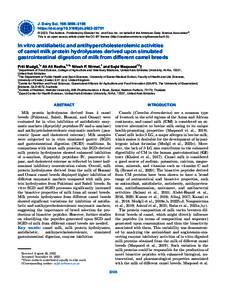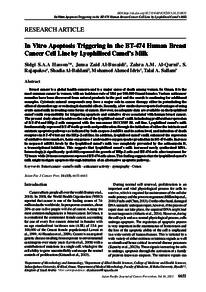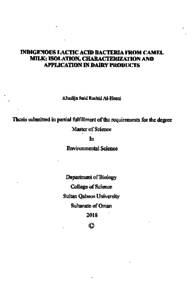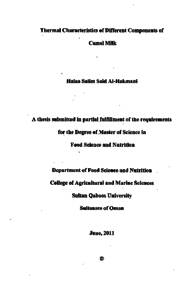Document
In vitro antidiabetic and antihypercholesterolemic activities of camel milk protein hydrolysates derived upon simulated gastrointestinal digestion of milk from different camel breeds.
Contributors
Publisher
Elsevier.
Gregorian
2023
Language
English
Subject
English abstract
Milk protein hydrolysates derived from 4 camel
breeds (Pakistani, Saheli, Hozami, and Omani) were
evaluated for in vitro inhibition of antidiabetic enzymatic markers (dipeptidyl peptidase IV and α-amylase)
and antihypercholesterolemic enzymatic markers (pancreatic lipase and cholesterol esterase). Milk samples
were subjected to in vitro simulated gastric (SGD)
and gastrointestinal digestion (SGID) conditions. In
comparison with intact milk proteins, the SGD-derived
milk protein hydrolysates showed enhanced inhibition
of α-amylase, dipeptidyl peptidase IV, pancreatic lipase, and cholesterol esterase as reflected by lower halfmaximal inhibitory concentration values. Overall, milk
protein hydrolysates derived from the milk of Hozami
and Omani camel breeds displayed higher inhibition of
different enzymatic markers compared with milk protein hydrolysates from Pakistani and Saheli breeds. In
vitro SGD and SGID processes significantly increased
the bioactive properties of milk from all camel breeds.
Milk protein hydrolysates from different camel breeds
showed significant variations for inhibition of antidiabetic and antihypercholesterolemic enzymatic markers,
suggesting the importance of breed selection for production of bioactive peptides. However, further studies
on identifying the peptides generated upon SGD and
SGID of milk from different camel breeds are needed.
Member of
Category
Journal articles




